The launch of our perfume company was a complete success. Everything has gone better than we could have hoped, on every front. One consequence of this is that the state of mind that I usually write from is nowhere to be found. My ideal writing state is expansive, dreamlike, naive. The current state is ecological, paranoid, and precise: I am having thoughts about this vendor and those sales taxes, and how that thing could screw everything up. How, then, do I make sense of the company’s launch in writing? Perhaps the answer is simply reconcile myself to writing in a more summary and less skillful fashion, for a period of time.
For today, I am going to take Visa’s cue and write a few mini-essays.
What excellence looks like
One of the pleasures of this company has been encountering diverse forms of excellence. What does the exact right perfume box sales rep look like? I know that fact, now: the ideal rep is an ex-weatherwoman from the Midwest who makes every call feel like an ASMR video. This was satisfying to learn. And then, at the launch event, I discovered what the exact right security person feels like.
The turnout was ridiculous—the venue, Ministry of Scent, had never seen anything like the response—and I was worried about crowd control as well as the potential freakiness of Scout’s fans, so I had to hire somebody for the door. A friend who throws big parties gave me the number of her go-to guy. The second he showed up, I thought: ah, here he is. He had a cherubic smile and a completely professional demeanor, but he quietly exuded, like barely audibly, the fact that he could maim anyone in a flash if it became necessary. Telling him what I wanted took 45 seconds, and he performed perfectly the whole evening without further instruction. He was in charge from moment one. He had to clear the sidewalk, and a guest later told me: “I’ve never been so elegantly told to fuck off.” Instantly, he reminded me of some guys I’d encountered at MMA gyms, and a quick google revealed that he was, in fact, an ex-MMA fighter. I had a small pang of envy that I will never be this particular kind of tough guy, but I am glad that I now have one available at a reasonable rate.
The one thing that seems to matter
Even though we are a small company, we have depended on an armada of people for our success, and I now am aware of the one variable that determines whether someone will be really helpful. It is: whether they actually care about the project succeeding. This sounds banal, and I think this is the concept of “ownership” that a lot of business books are written about. But to me, there is a profundity to it, a really striking felt difference between when it’s there in someone, and when it isn’t. When someone deeply cares about the success of your project, you cannot stop them from overdelivering, and professional interactions with them almost feel therapeutic. When someone doesn’t, they will do the minimum required to sustain their immediate reputation, and there is an almost adversarial tinge to the interactions, because both parties are trying to get the best rate of exchange.
It is interesting to consider how much of hiring is an attempt to search for this quality, and how hard it is to find directly. We look for proxy attributes that suggest that someone might be the kind of person who cares about their work: professional history, educational background, being on time to Zoom calls. But none of these are actually great proxies, and many people who are savvy communicators are pretty good at faking the spark of interest. Some of the long-term success of this company will depend on our ability to spot spark-fakers.
Another interesting implication: a core business skill is the ability to nudge others towards ownership, or help them maintain it over time. This is one reason that Scout is a fantastic co-founder, although I didn’t clock this as important when we decided to begin the company: she recruits comrades everywhere she goes, bystanders want to join her team. It occurs to me that if you’re trying to start a significant enterprise, and you don’t have this quality, you might need a co-founder who does.
An unsuitable framework for stress
We had a huge number of orders out of the gate, more than we’d expected and more than the warehouse was prepared for. This was stressful to the point where I didn’t really sleep for a week. Partway in, I realized two things.
Everyone is carrying around, as part of their mental software, a framework about what is stressful and what stress means, and the framework is sometimes not matched to the current situation.
My framework around this kind of stress was way out of date—it was taken from my years of being in fine dining service.
Expanding on the second point: I was fairly good at being a fine dining bartender, and one reason was that I was genuinely worried about everyone at my bar having a good time. When their food hadn’t turned up, I was aware of it on a bodily level, as a feeling of incompletion. When they weren’t having a good time, their malaise was a tactile presence that I wanted to manipulate, with a quip or a timely amaro. And this was initially the mentality I took into our order fulfillment process. Like: when we had a couple thousand unfilled orders in the queue, I experienced it as a coast-to-coast dinner service, where 2000 people were waiting for a hamburger.
This was unsustainable and unhelpful. Consciously, I knew that shipping delays would be an inevitable occasional consequence of moving glass bottles of liquid around the country, especially during spikes of demand. Dozens of late packages were a sign that we were doing something well—scaling beyond our existing capacity—although they were also a problem to resolve. However, it took about two weeks for my old stress framework to fall away, and I don’t know that it was an entirely conscious process. One day, I just felt the fine dining mentality go, like an icicle falling from a branch. Now I wake up, see five emails of complaint, and think that is about the right number.
The body high
I can see why people get addicted to entrepreneurship—sell a company, swear that they’re going to cozymax on a ranch somewhere, and then, to the dismay of their families, get another one going within a year’s time. This game has a quality that the best games all do: unpredictable patches of difficulty. Our best-selling fragrance was not actually that hard to develop, because we were lucky to get one of the best working perfumers to shoot out a masterpiece. You know what was really hard, from my perspective? Figuring out how to get some glass vials that were stuck in customs, out of customs. That was a mini-game I didn’t know I’d be playing, and I hated it, but it was so gratifying to finally get the email indicating I’d manipulated the relevant bureaucracy decisively.
Around the time of the launch, I went hypomanic for a few days. Nothing bad happened, I was just really keyed up. It was becoming clear that the company was taking off, and I felt this as both bliss, and the approach of many more such mini-games, patches of complexity that I would be completely unprepared for. In my body, in superposition, I could feel the incredible lightness of success, and the incredible weight of approaching responsibility. Having taken prescription stimulants, I can tell you that they are nothing compared to the energy of this superposition, which shot through my body in waves. It was lemony and electric. I felt constantly out of breath. Between hobnobbing with people at the party, I had to occasionally squat. I just had to get close to the ground.
Being a CEO who meditates a lot
Years of meditation practice have made my consciousness much more in-the-moment-y, much more like a continuous flow. I feel less moored in narrative than I used to, and more like there are simply phenomena flashing on the screen of awareness, over and over again. This is a strange combination with running a product company, which is an enterprise composed of many small compounding decisions. Every day I have thought about the long-term welfare of the company and have made relevant decisions, but the days still feel like a continuous melting, not an accumulating stack. When I flew out to New York to oversee production, it felt a little bit like suddenly becoming aware in a dream. It was like: oh, some people seem to have constructed a company. A main person was me, I guess? What an interesting occurrence!
Full circle moment
My whole adult personality was founded on a mating strategy, which is: women will be interested in you if you do creative things, and one of them will be an interesting mate. I remember the exact moment when I discovered the viability of this strategy. I was in grade school, and a popular blonde girl — let’s call her Cheryl — looked at a drawing I was doing in class. Cheryl was too popular to be seen speaking with me in front of others, although we had a furtive conversation on the playground here and there. But in that moment she forgot herself and exclaimed “Sasha, you’re like Picasso or something!” It was the first moment I’d been greeted with genuine public female admiration, and there, I thought, was my ticket.
I was basically correct and I have arrived at the win condition of the strategy; Cate has told me that my writing was a big factor in her early interest. However, interestingly, none of the creative things I’ve created or contributed to have been for an audience of popular girls.
But now, I am a co-founder in a perfume company. TikTok reviews of our perfumes are pouring in, and I was watching one of them, in which a young woman smells Incarnate, and simply says, “oh my God. Oh my God.” She was elated by her discovery of a perfect autumn scent. On my side of the monitor, I was similarly elated when I realized: oh, wow. This girl is a total Cheryl. Finally, I am doing something for that audience, my original target demographic. I feel that this was a tremendously elegant thing for the universe to have arranged.
Here are some of my favorite photos of the launch, courtesy of Mark Estefanos.
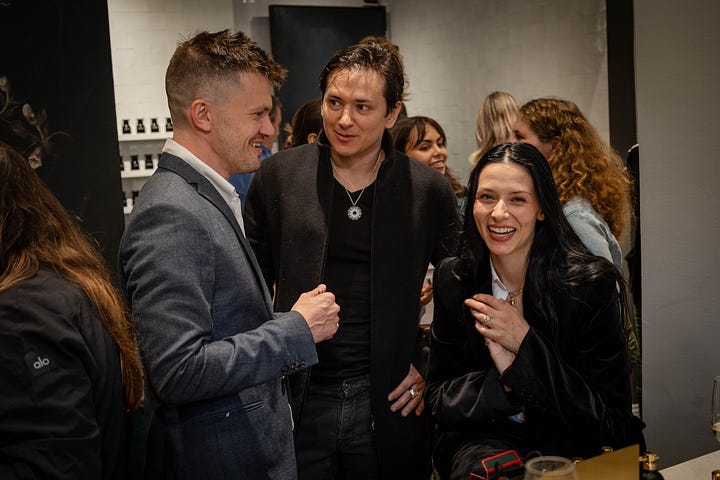
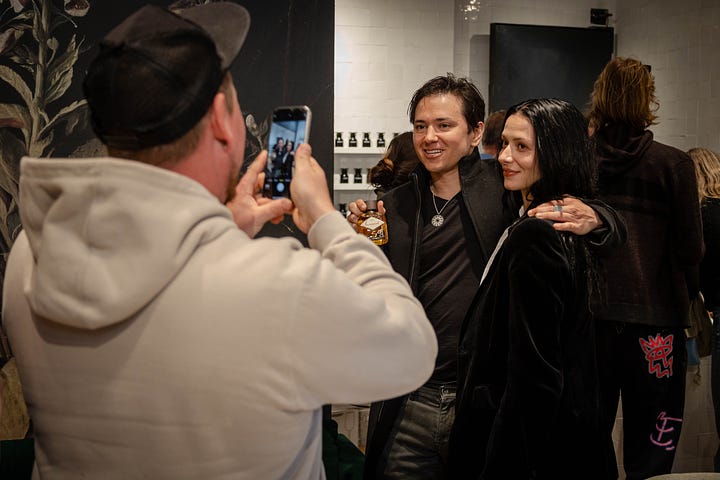
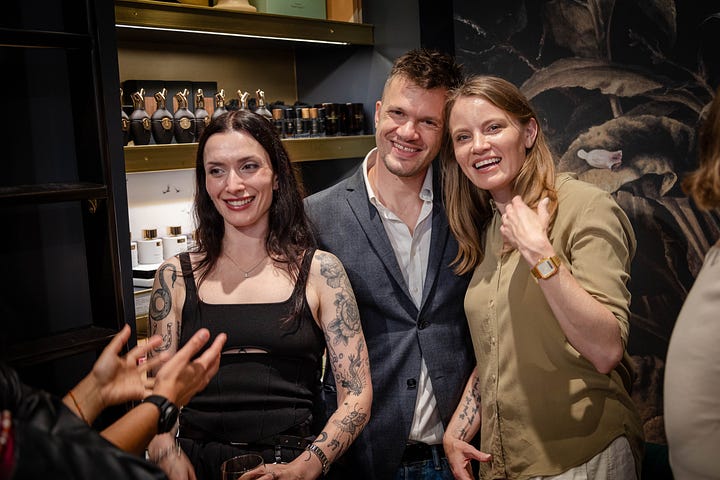
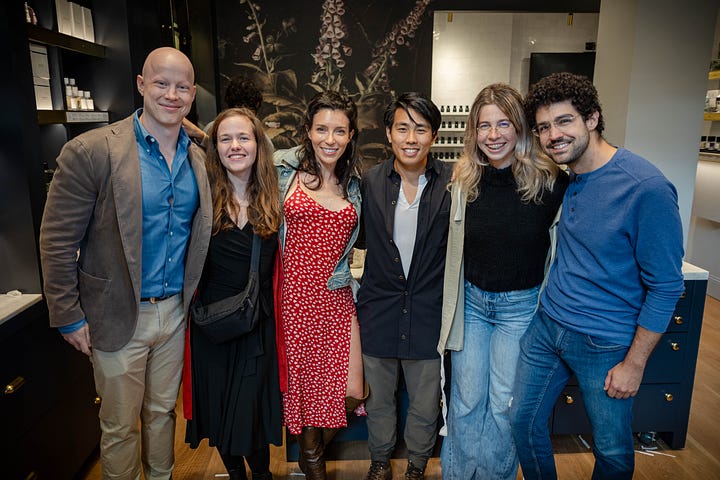

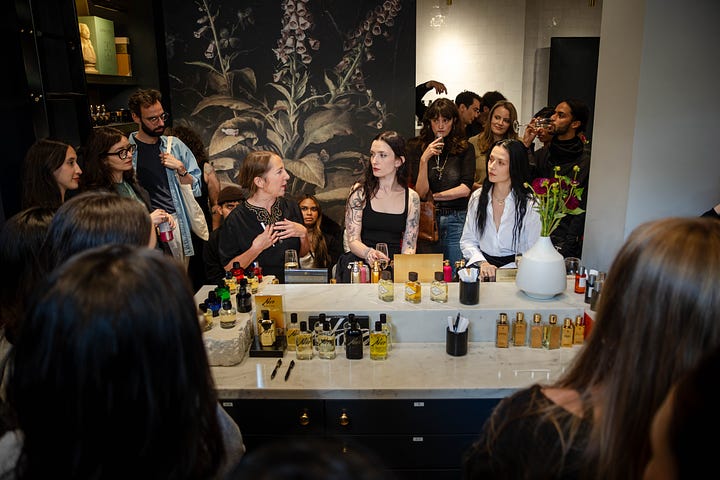
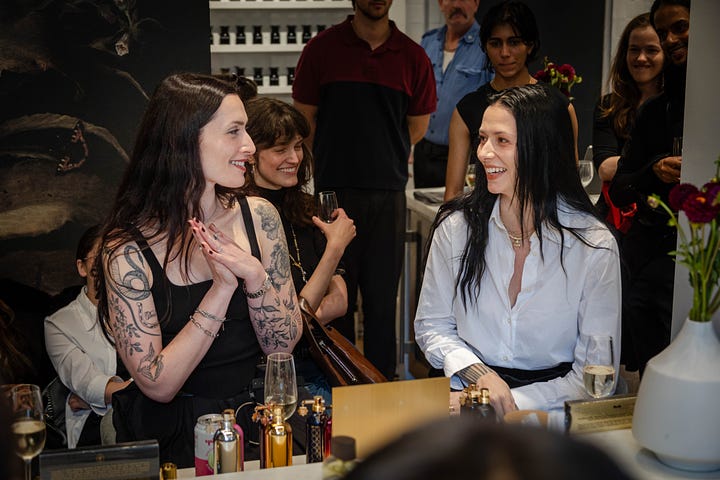
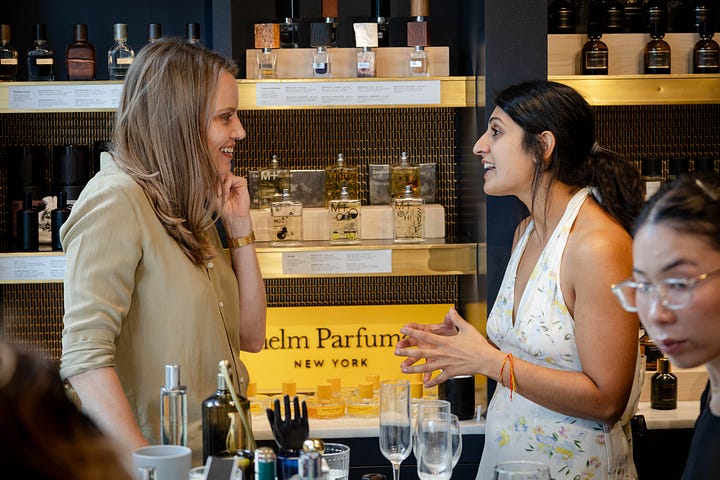




Absolutely loved this writing. “CEO who meditates a lot” is way more interesting to me than “neuroscientist explains meditation”.
This. This. So much this.
I am just realizing my first theatre project and am connecting to so many things you are saying. Last week I stood in the space where the play is probably going to be performed, and thought: This is getting surprisingly real surprisingly quickly.
The most interesting part for me is the non-linear creativity. Like: You suddenly need things you never thought you are going to need and then you do something and what you needed shows up in a surprising, totally different way, and yet being everything you hoped for, and more.
It is a fun game, and yes, you are right, probably one to get addicted to. But there are worse addictions, right?